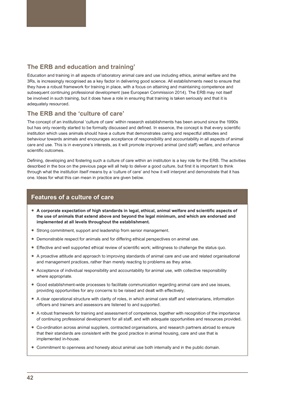
42
The ERB and education and training"
Education and training in all aspects of laboratory animal care and use including ethics, animal welfare and the
3Rs, is increasingly recognised as a key factor in delivering good science. All establishments need to ensure that
they have a robust framework for training in place, with a focus on attaining and maintaining competence and
subsequent continuing professional development (see European Commission 2014). The ERB may not itself
be involved in such training, but it does have a role in ensuring that training is taken seriously and that it is
adequately resourced.
The ERB and the "culture of care"
The concept of an institutional "culture of care" within research establishments has been around since the 1990s
but has only recently started to be formally discussed and defined. In essence, the concept is that every scientific
institution which uses animals should have a culture that demonstrates caring and respectful attitudes and
behaviour towards animals and encourages acceptance of responsibility and accountability in all aspects of animal
care and use. This is in everyone"s interests, as it will promote improved animal (and staff) welfare, and enhance
scientific outcomes.
Defining, developing and fostering such a culture of care within an institution is a key role for the ERB. The activities
described in the box on the previous page will all help to deliver a good culture, but first it is important to think
through what the institution itself means by a "culture of care" and how it will interpret and demonstrate that it has
one. Ideas for what this can mean in practice are given below.
Features of a culture of care
A corporate expectation of high standards in legal, ethical, animal welfare and scientific aspects of
the use of animals that extend above and beyond the legal minimum, and which are endorsed and
implemented at all levels throughout the establishment.
Strong commitment, support and leadership from senior management.
Demonstrable respect for animals and for differing ethical perspectives on animal use.
Effective and well supported ethical review of scientific work; willingness to challenge the status quo.
A proactive attitude and approach to improving standards of animal care and use and related organisational
and management practices, rather than merely reacting to problems as they arise.
Acceptance of individual responsibility and accountability for animal use, with collective responsibility
where appropriate.
Good establishment-wide processes to facilitate communication regarding animal care and use issues,
providing opportunities for any concerns to be raised and dealt with effectively.
A clear operational structure with clarity of roles, in which animal care staff and veterinarians, information
officers and trainers and assessors are listened to and supported.
A robust framework for training and assessment of competence, together with recognition of the importance
of continuing professional development for all staff, and with adequate opportunities and resources provided.
Co-ordination across animal suppliers, contracted organisations, and research partners abroad to ensure
that their standards are consistent with the good practice in animal housing, care and use that is
implemented in-house.
Commitment to openness and honesty about animal use both internally and in the public domain.